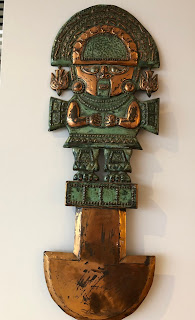This walk takes place February 23rd in Seasalter, on the Kent Coast.
http://terminaliafestival.org you can check the festival out and find us under events.
 |
| Inti |
The first has been connecting my thoughts about the solar panels proposed for the landscape in Seasalter with the Inca deity' s Inti, the God of the Sun, and Mama Pacha, Mother Earth . I was born in Bolivia and grew up in Lima, Peru. At school we learnt about the Incas probably in the same way as children in England learn about the Romans. So I tend to draw on this bank of knowledge using the mythic method, a method identified by TS Eliot and James Joyce, which draws on myth from the past as a way to help us connect with the present.
Today I walked in Seasalter and thought about how important it is to feel this connection with the earth and the sun. In Peru there are no figures for Mother Earth (Mama Pacha), aside for those made to sell to tourists, as Andean people believe she can be felt in every place, at every moment and in every living being. Where do the thousands of solar panels proposed for this site fit in to this scenario, I wonder?
Andean people still believe strongly in the importance of living in harmony with nature and not taking too much from Pachamama. How will Mother Earth change if the rays of the sun are diverted from the land and harnessed as energy ? I am not against a greener energy but as I walked I wondered how much energy do we really need? Should we reflect on our role as consumers ? Where are the boundaries to our consumption?
 There are ten of us walking to celebrate Terminus, the Roman God of boundaries. We will be reading poetry, listening to music and meditatively knotting ropes. I have made the ropes for this walk by hand in my studio , they are in the photo on the right.
There are ten of us walking to celebrate Terminus, the Roman God of boundaries. We will be reading poetry, listening to music and meditatively knotting ropes. I have made the ropes for this walk by hand in my studio , they are in the photo on the right.This practice also derives from my knowledge of the Incas and the records that they kept through a system of knotted ropes called Quipus. To this day the village members, who are trained in their roles as Quipucamayocs in villages in the Andes, are able to read the knotted ropes that our text based society is unable to translate. Although there are theories and explanations offered by researchers and anthropologists there is still a mystery in the artefacts which I love.

We will reflect on our thoughts at the end of the walk when we attach our knotted ropes to our Vara ( Pole) . Below is the Vara I have made for this walk with a strap that I have woven on an inkle loom . The weave is symbolic of the land we will be walking around and I will explain this on the walk.

 |
| A Vara for Terminalia |
This Vara (Pole) will then join the collection of 12 Varas in my studio.I have been leading walks and assembling these Varas since 2015. Each Vara holds the ropes knotted as a record of a particular walk which I have led supported by friends, academics and artists.
I would like to thank all those who are joining me on this walk and giving their support in making the Vara contributing to an exchange of ideas, meditative knotting and poetry writing in the pub at the end. This is the first time we will take the Vara on the walk with us and then put the ropes on to the Vara together as a group. I usually take the ropes back to my studio and then assemble it there on my own. I think it will add to the ritual of the walk and am looking forward to seeing how this develops.
I am hoping that our poetry writing will be taking a leaf out of ecopoetics as described by the founder of the ecopoetics journal Dr Jonathan Skinner (Warwick University) who will be joining us on this walk. We will be locating our poem in and through the 'site' rather than kinds of 'writing':
"Taking writing out of the classroom, the bookstore and the library even out of the book itself shifting the focus from themes and styles to an institutional critique of green discourse itself and to an array of practices converging on the oikos, the planet earth that is the only home our species currently knows"(1).
I'm looking forward to seeing what we come up with.
Looking forward to celebrating Terminalia with you all on Saturday!
(1) https://jacket2.org/commentary/jonathan-skinner



No comments:
Post a Comment